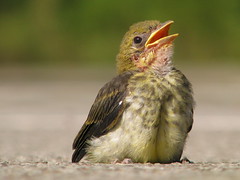When perusing the program notes for the concert I
just attended last Saturday at Heinz Hall with Manfred Honeck conducting
the Pittsburgh Symphony Orchestra, I discovered to my delight that two
of the selections were All About Birds, in a sense. Birding is a hobby
of mine, not as adamantly as some, but in a fun way whenever I get a
chance. So here I was ready to listen to and discover for myself a new
work which integrates actual bird calls with music.
If you want information All About Birds, try The Cornell Lab of Ornithology. Locally there is the Carnegie Museum and the National Aviary. In my backyard there a many migrants that pass through every Spring and Autumn and of course the many residents of Summer and Winter are easily identified. What I like most is listening to and being able to recognize each bird's song or call, often without even seeing the bird. I learned to recognize many species when I helped with the Second Pennsylvania Breading Bird Atlas a number of years ago.
I've
never been able to visit or hear the sounds of birds from the Arctic. If you want information All About Birds, try The Cornell Lab of Ornithology. Locally there is the Carnegie Museum and the National Aviary. In my backyard there a many migrants that pass through every Spring and Autumn and of course the many residents of Summer and Winter are easily identified. What I like most is listening to and being able to recognize each bird's song or call, often without even seeing the bird. I learned to recognize many species when I helped with the Second Pennsylvania Breading Bird Atlas a number of years ago.
 That's why it was a thrill to experience this concert which highlights
these sounds. Finnish composer Einojuhani Rautavaara recorded the songs
of Arctic
birds, which are integrated into his Concerto for Birds
and Orchestra, Cantus Arcticus. The birds I did not recognize,
and some of their calls were hauntingly eerily alien, not like anything
I've heard before. The fascinating way which the composer interwove the
birds with the orchestra peaked my interest, yet I found myself trying
to discern just the orchestral music, and I found it to be quite
interesting all by itself, as if it didn't even need the birds to
support the body of work, but the amalgamation was as beautiful as
either of the parts.
That's why it was a thrill to experience this concert which highlights
these sounds. Finnish composer Einojuhani Rautavaara recorded the songs
of Arctic
birds, which are integrated into his Concerto for Birds
and Orchestra, Cantus Arcticus. The birds I did not recognize,
and some of their calls were hauntingly eerily alien, not like anything
I've heard before. The fascinating way which the composer interwove the
birds with the orchestra peaked my interest, yet I found myself trying
to discern just the orchestral music, and I found it to be quite
interesting all by itself, as if it didn't even need the birds to
support the body of work, but the amalgamation was as beautiful as
either of the parts.I saw this on a building that I photographed in Rothenburg ob der Tauber a few years ago, and it reminds me of Classical music:
Der Alten kunst gar lang versteckt, hab ich hier wieder aufgedeckt. Das
sie nun lacht in neuer Pracht, Und mir und andern Freude macht.
Long ago the art the ancients hid, I've uncovered here again. She now laughs in newer splendor, and makes for me and others joy.
Long ago the art the ancients hid, I've uncovered here again. She now laughs in newer splendor, and makes for me and others joy.


No comments:
Post a Comment